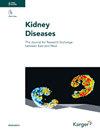23.68%的儿童类固醇抵抗性肾病综合征的单基因病因:一项单中心研究
IF 3.1
4区 医学
Q1 UROLOGY & NEPHROLOGY
引用次数: 0
摘要
简介:类固醇抵抗性肾病综合征(SRNS)是儿童终末期肾病的第二大常见原因,主要与局灶节段性肾小球硬化(FSGS)相关。基因组科学的进步使20 - 30%的SRNS患者能够识别致病变异。方法:采用全外显子组测序(WES)方法探讨儿童SRNS的遗传原因。回顾性分析2018 - 2022年我院收治的SRNS患者101例,肾病蛋白尿合并FSGS患者13例。对于已知的单基因原因分析,我们通过查阅OMIM数据库和文献,生成了已知的71个SRNS基因列表。结果:23.68%的患者发现了致病变异,其中WT1(7/27)、NPHS1(3/27)、ADCK4(3/27)和ANLN(2/27)是最常见的突变基因。5例患者携带表型基因变异,包括MYH9、MAFB、TTC21B、AGRN和FAT4。变异检出率以先天性肾病综合征和综合征型SRNS两亚型组最高。总的来说,我们发现的68.75%的变异是新的,以前没有文献报道过。结论:全面的遗传分析是实现遗传诊断临床效益的关键。我们建议所有患有SRNS的儿童进行基因检测,特别是那些早发和外源性表型的儿童。本文章由计算机程序翻译,如有差异,请以英文原文为准。
Monogenic Causes Identified in 23.68% of Children with Steroid Resistant Nephrotic Syndrome: A Single-Centre Study
Introduction: Steroid resistant nephrotic syndrome (SRNS) is the second most common cause of end-stage kidney disease in children, mostly associated with focal segmental glomerulosclerosis (FSGS). Advances in genomic science have enabled the identification of causative variants in 20 – 30% of SRNS patients. Methods: We used whole exome sequencing (WES) to explore the genetic causes of SRNS in children. Totally 101 patients with SRNS, and 13 patients with nephrotic proteinuria and FSGS were retrospectively enrolled in our hospital between 2018 and 2022. For the known monogenic causes analysis, we generated a known SRNS gene list of 71 genes through reviewing the OMIM database and literature. Results: Causative variants were identified in 23.68% of our cohort, and the most frequently mutated genes in our cohort were WT1 (7/27), NPHS1 (3/27), ADCK4(3/27), and ANLN (2/27). Five patients carried variants in phenocopy genes, including MYH9, MAFB, TTC21B, AGRN, and FAT4. The variant detection rate was the highest in the two subtype groups with congenital nephrotic syndrome and syndromic SRNS. In total, 68.75% of variants we identified were novel, and have not been previously reported in literature. Conclusion: Comprehensive genetic analysis is key to realizing the clinical benefits of a genetic diagnosis. We suggest that all children with SRNS undergo genetic testing, especially those with early onset and extrarenal phenotypes.
求助全文
通过发布文献求助,成功后即可免费获取论文全文。
去求助
来源期刊

Kidney Diseases
UROLOGY & NEPHROLOGY-
CiteScore
6.00
自引率
2.70%
发文量
33
审稿时长
27 weeks
期刊介绍:
''Kidney Diseases'' aims to provide a platform for Asian and Western research to further and support communication and exchange of knowledge. Review articles cover the most recent clinical and basic science relevant to the entire field of nephrological disorders, including glomerular diseases, acute and chronic kidney injury, tubulo-interstitial disease, hypertension and metabolism-related disorders, end-stage renal disease, and genetic kidney disease. Special articles are prepared by two authors, one from East and one from West, which compare genetics, epidemiology, diagnosis methods, and treatment options of a disease.
 求助内容:
求助内容: 应助结果提醒方式:
应助结果提醒方式:


